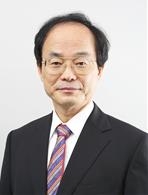Greetings from the Chairperson

Kenjiro Kohri, MD, Ph.D.
Chairperson
Nagoya City University (NCU) was established as a public university consisting of the Medical School and the Faculty of Pharmaceutical Sciences in 1950. Its lineage, however, stretches back to Nagoya School of Pharmacy (established in1884), and Nagoya Municipal Women’s Higher Medical School (established in1943). As seen today, NCU has developed into a comprehensive university comprising seven schools and faculties (the Medical School, the Faculty of Pharmaceutical Sciences, the Faculty of Economics, the School of Humanities and Social Sciences, the School of Design and Architecture, the School of Nursing, and the School of Biology and Integrated Sciences) and seven graduate schools (the Graduate School of Medical Sciences, the Graduate School of Pharmaceutical Sciences, the Graduate School of Economics, the Graduate School of Humanities and Social Sciences, the Graduate School of Design and Architecture, the Graduate
School of Nursing, and the Graduate School of Science).
One important feature of NCU is its small-class education(about 7 students per 1 teacher).
NCU contributes to society through the collective commitment of faculty members across schools and faculties to the cultivation of excellent human resources, the dissemination of cutting-edge research to the world, and the dedication to the improvement of public health and welfare.
On the memorial day of its foundation (October 28) in 2014, NCU established the Charter of Nagoya City University and formulated “the Future Plan of Nagoya City University”. Based on them, the School of Biology and Integrated Sciences, the Course of Economics and Management in Health was established in the Graduate School of Economics, the Clinical Medicine Design Field was established in the Graduate School of Medical Sciences, and the Clinical Psychology Course was established in the Graduate School of Humanities and Social Sciences. The Center for Urban Policy Research and Education were established. The Center for Creative Collaboration of Industry-Academia-Government was established, and the SDGs center was established. These courses are opening up new academic fields. From April 2021, Nagoya City East Medical Center and Nagoya City West Medical Center have joined us as hospitals affiliated with our Medical School. And the group of university hospitals with approximately 1,800 authorized sickbeds was born. Given that the original Future Plan of Nagoya City University has been almost fully realized, we have newly formulated “the Future Plan of Nagoya City University 2021” in 2021 through the efforts of about 100 faculty members. Based on that, we have formulated “the Future Plan of Graduate Schools, etc.2021”,and we are currently in the next stage.
During the third term of the medium-term goals and medium-term plans (from the 2018 academic year to the 2023 academic year), administrative grants for this term were increased up to the initial level that NCU received when it was incorporated. This is “sharp recovery” for which NCU has long wished. Being deeply grateful for the warm understanding and support from Nagoya City, NCU will strive to become a university in which citizens feel pride and affinity.
For such activities, according to the National Survey on Regional Contribution Activities of Universities 2021 (Nikkei Glocal), NCU was evaluated as 1st throughout the country. According to the Times Higher Education University Impact Rankings 2021 evaluating the engagement with SDGs, NCU was evaluated as 1st among public universities in Japan for three consecutive years.Furthermore, the number of times NCU was featured in the mass media has quadrupled in the last four years. This has all been due to the energetic activity of NCU’s faculty members and students. NCU is determined to maintain this momentum and continue to strive to become a university that can lead the world.NCU will accurately grasp the changes in the social situation around the university, and persevere in its effort toward reformation.
I humbly ask for your understanding of the direction we are taking and your warm support.
Kenjiro Kohri, MD, Ph.D. Chairperson Nagoya City University
School of Nursing, and the Graduate School of Science).
One important feature of NCU is its small-class education(about 7 students per 1 teacher).
NCU contributes to society through the collective commitment of faculty members across schools and faculties to the cultivation of excellent human resources, the dissemination of cutting-edge research to the world, and the dedication to the improvement of public health and welfare.
On the memorial day of its foundation (October 28) in 2014, NCU established the Charter of Nagoya City University and formulated “the Future Plan of Nagoya City University”. Based on them, the School of Biology and Integrated Sciences, the Course of Economics and Management in Health was established in the Graduate School of Economics, the Clinical Medicine Design Field was established in the Graduate School of Medical Sciences, and the Clinical Psychology Course was established in the Graduate School of Humanities and Social Sciences. The Center for Urban Policy Research and Education were established. The Center for Creative Collaboration of Industry-Academia-Government was established, and the SDGs center was established. These courses are opening up new academic fields. From April 2021, Nagoya City East Medical Center and Nagoya City West Medical Center have joined us as hospitals affiliated with our Medical School. And the group of university hospitals with approximately 1,800 authorized sickbeds was born. Given that the original Future Plan of Nagoya City University has been almost fully realized, we have newly formulated “the Future Plan of Nagoya City University 2021” in 2021 through the efforts of about 100 faculty members. Based on that, we have formulated “the Future Plan of Graduate Schools, etc.2021”,and we are currently in the next stage.
During the third term of the medium-term goals and medium-term plans (from the 2018 academic year to the 2023 academic year), administrative grants for this term were increased up to the initial level that NCU received when it was incorporated. This is “sharp recovery” for which NCU has long wished. Being deeply grateful for the warm understanding and support from Nagoya City, NCU will strive to become a university in which citizens feel pride and affinity.
For such activities, according to the National Survey on Regional Contribution Activities of Universities 2021 (Nikkei Glocal), NCU was evaluated as 1st throughout the country. According to the Times Higher Education University Impact Rankings 2021 evaluating the engagement with SDGs, NCU was evaluated as 1st among public universities in Japan for three consecutive years.Furthermore, the number of times NCU was featured in the mass media has quadrupled in the last four years. This has all been due to the energetic activity of NCU’s faculty members and students. NCU is determined to maintain this momentum and continue to strive to become a university that can lead the world.NCU will accurately grasp the changes in the social situation around the university, and persevere in its effort toward reformation.
I humbly ask for your understanding of the direction we are taking and your warm support.
Kenjiro Kohri, MD, Ph.D. Chairperson Nagoya City University


